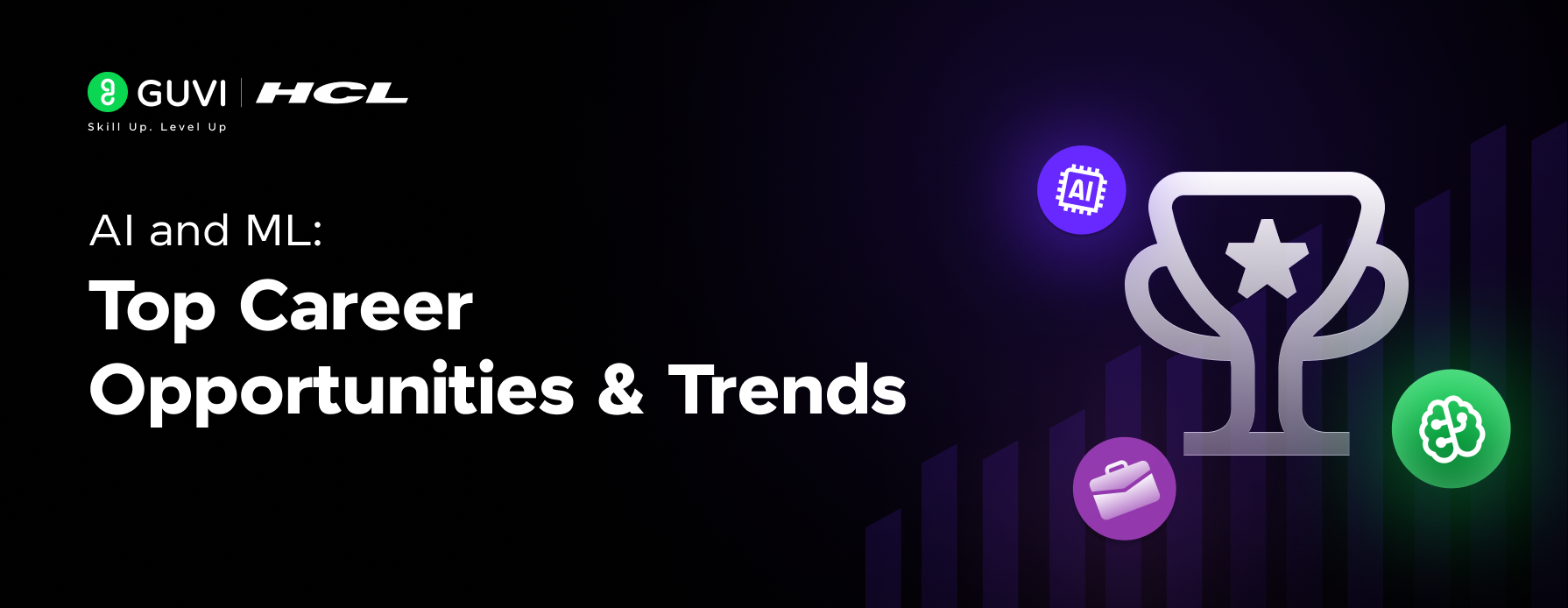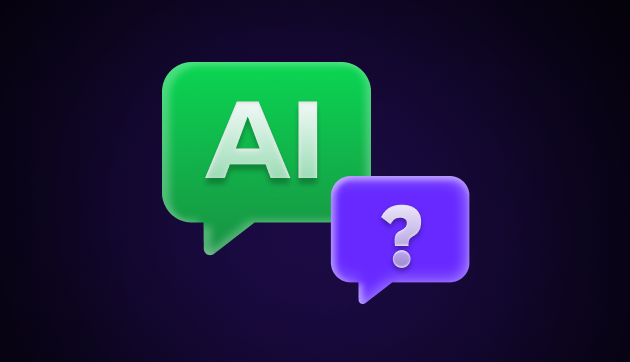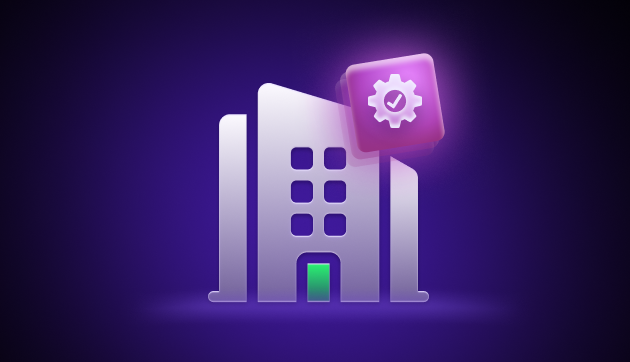
AI and ML Job Opportunities: Top Trends to Consider in India
Nov 22, 2024 5 Min Read 1583 Views
(Last Updated)
Is your career ready for the AI and ML revolution happening right now? As companies rush to adopt the latest technologies, Machine Learning (ML) is no longer a niche skill. The job market has come a long way, with Artificial Intelligence (AI) driving innovations across industries. Employers are no longer searching for candidates with one narrow focus; rather, they want professionals skilled in both AI and ML to tackle real-world challenges. Those with this dual expertise stand out in an increasingly crowded job market.
In this blog, we’ll explore the top AI and ML job opportunities in India, highlighting the roles that are driving growth and offering competitive salaries. If you’re a seasoned tech professional or just starting out, understanding the trends shaping the future of AI and ML could be the key to figuring out your next career move.
Table of contents
- Top AI and ML Job Opportunities in India's Growing Tech Ecosystem
- Leading AI and ML Career Paths: Salaries and Employers to Watch
- AI in Retail and Education: Job Growth in Emerging Sectors
- Emerging AI and ML Trends That Are Shaping New Job Roles
- Retrieval-Augmented Generation (RAG) and Its Impact on AI Jobs
- Skills and Certifications for Career in AI and ML
- Top Technical Skills for AI and ML
- Understanding the AI Talent Gap: How Job Seekers Can Stand Out
- Ethical AI and Governance: A Rising Concern
- Final Thoughts
- Frequently Asked Questions
- What’s the difference between AI and ML, and why should I focus on both?
- What is the future of AI in creative industries?
- How can I showcase AI and ML skills without prior work experience?
- How do AI and ML influence cybersecurity roles?
- What role does AI play in sustainability efforts?
Top AI and ML Job Opportunities in India’s Growing Tech Ecosystem
From e-commerce to healthcare, companies are increasingly adopting these technologies, driving a surge in demand for skilled professionals in India’s tech ecosystem.
What makes this exciting is the wide range of AI and ML job opportunities across industries. Be it Data Science, AI consulting, or robotics, there’s no shortage of roles available in both established and emerging sectors.
Leading AI and ML Career Paths: Salaries and Employers to Watch
The Indian job market is buzzing with AI and ML roles that offer competitive salaries and long-term career prospects. Here are some of the top positions that are in high demand:
| Industry | Key Roles | Average Salary (INR) | Top Companies Hiring |
| Healthcare | AI Engineer, Data Scientist | ₹15-20 LPA | Practo, Apollo |
| Finance | ML Engineer, AI Consultant | ₹18-25 LPA | Paytm, ICICI Bank |
| Manufacturing | AI Specialist, Robotics Engineer | ₹12-18 LPA | Tata, Mahindra |
| E-Commerce | Data Scientist, AI Engineer | ₹14-22 LPA | Amazon, Flipkart |
| Retail | AI Consultant, ML Engineer | ₹15-23 LPA | Reliance Retail, BigBasket |
| Telecommunications | AI Specialist, Data Analyst | ₹16-24 LPA | Airtel, Reliance Jio |
| Automotive | Robotics Engineer, AI Developer | ₹13-20 LPA | Maruti Suzuki, Bosch |
AI in Retail and Education: Job Growth in Emerging Sectors
While industries like e-commerce and telecommunications are already established in AI adoption, retail and education are experiencing rapid growth in AI-driven roles. In retail, companies are looking for AI consultants to help develop smarter inventory systems, predictive analytics, and customer recommendation engines. Meanwhile, in education, AI researchers and chatbot developers are in demand to create personalized learning tools and systems.
With these sectors embracing AI, the potential for job creation is immense, providing opportunities not only for AI engineers but also for professionals who can merge AI with domain-specific knowledge.
Emerging AI and ML Trends That Are Shaping New Job Roles
AI and ML are reshaping various industries, giving rise to new, specialized roles. As businesses move beyond generic AI models, there’s a growing demand for domain-specific AI models customized to sectors like healthcare, logistics, and retail, among others. This trend requires professionals who, along with technical expertise, understand the specific needs of these industries. It’s creating new job opportunities for those who can apply AI in focused and practical ways.
In addition to industry-specific models, the use of AI-powered tools to increase productivity across multiple sectors is transforming how work is done. Roles that once didn’t require AI, like customer service or supply chain management, are now seeing an influx of AI applications, creating new positions for those skilled in integrating AI into traditional business processes.

Retrieval-Augmented Generation (RAG) and Its Impact on AI Jobs
Retrieval-Augmented Generation (RAG) is making waves by blending Generative AI’s power with real-time information retrieval, a critical feature for industries where accuracy is non-negotiable. By pulling precise data from databases, RAG ensures AI outputs are both relevant and reliable, especially in areas like customer service, content generation, and legal support.
New roles such as RAG engineers and AI content accuracy specialists are emerging, focused on optimizing and validating RAG-based processes. As more industries realize the importance of real-time, data-driven AI, these positions are seeing a steady rise. GUVI’s ongoing Guinness World Record SAWiT GenAI Challenge, which showcases the potential of RAG in AI solutions, offers a unique opportunity for women students & professionals to get a glimpse into how this technology is shaping the future of AI in real-world applications. The event’s deadline has been extended till November, so this is your chance to take advantage of this valuable experience while exploring GenAI’s career-boosting benefits.

Skills and Certifications for Career in AI and ML
As the demand for AI and ML job opportunities continues to rise, having the right skills and certifications is critical to staying competitive. Employers are increasingly looking for professionals who can understand and apply AI concepts using tools like Python, TensorFlow, and AWS. Mastering these technologies positions candidates to stand out in a growing market where hands-on experience is vital.
Programs like GUVI’s Artificial Intelligence & Machine Learning Course provide hands-on experience with AI tools, world-class mentorship, immersive workshops, and career guidance, training participants with both technical skills and prestigious credentials. As AI and ML job opportunities expand, an IIT-M certification can be a game-changer for career growth and job security.
Top Technical Skills for AI and ML
Mastering the right technical skills is critical for advancing in AI and ML job opportunities. With companies increasingly seeking AI professionals who can handle complex projects, knowing how to work with Python, TensorFlow, and Cloud-based AI platforms like AWS has become essential. Additionally, expertise in specialized areas such as Natural Language Processing (NLP) and Deep Learning offers a significant edge, helping professionals secure high-paying roles in industries like healthcare, finance, and beyond.
Here’s a breakdown of the most in-demand skills, the roles they align with, and the certifications that can help you advance your career:
| Skill | Role | Practical Application | Certification Options |
| Python | Data Scientist, ML Engineer | Data Modeling, Automation | GUVI AI/ML Certification |
| TensorFlow | ML Developer | Neural Network Training | Google TensorFlow Certification |
| Cloud-based AI (AWS) | AI Architect, Cloud Engineer | Deploying AI Models, managing Cloud infrastructure | AWS-Certified Machine Learning Specialty |
| Natural Language Processing (NLP) | NLP Engineer, AI Researcher | Text analysis chatbots, sentiment analysis | NLP with Python Certification by GUVI, AWS-Certified Machine Learning Specialty |
| Deep Learning | ML Engineer, Data Scientist | Neural networks, autonomous systems | Google TensorFlow Certification |
Understanding the AI Talent Gap: How Job Seekers Can Stand Out
The rapid growth of AI and ML technologies has led to a significant talent gap, where demand for skilled professionals outpaces supply. According to a 2023 Deloitte report, 41% of organizations feel only slightly or not at all prepared to address talent concerns related to AI adoption. Furthermore, 37% of leaders acknowledge their companies are underprepared for AI disruptions.
To bridge this gap and stand out in a competitive market, job seekers need to focus on a few key areas:
- Develop specialized AI and ML skills: Employers are looking for candidates with expertise in areas like machine learning algorithms, NLP, and deep learning.
- Gain practical experience: Hands-on projects and internships provide valuable real-world experience that sets candidates apart.
- Earn relevant certifications: Credible certifications can boost your credibility and help close the talent gap.
- Stay ahead of emerging trends: Being aware of evolving AI applications and technologies ensures you’re always prepared for new AI and ML opportunities.
- Build a strong portfolio: Showcasing your skills through projects and a GitHub portfolio can make a lasting impression on potential employers.

Ethical AI and Governance: A Rising Concern
As AI continues to advance, ethical concerns have become a central issue for businesses and regulators alike. Ensuring that AI systems are responsible, fair, and transparent is now a priority, and professionals who understand these concerns are in high demand. Ethical considerations are also shaping how AI evolves, presenting both challenges and possibilities.
Here are some key ethical issues that will govern future AI and ML trends:
- Bias in AI algorithms: AI systems can inherit biases from the data they are trained on, leading to unfair outcomes. Addressing this requires careful dataset selection and algorithm adjustments.
- Data privacy and security: AI often processes sensitive user data, raising concerns about privacy breaches. Compliance with data protection laws like GDPR is crucial.
- Transparency and explainability: Many AI models, particularly deep learning systems, are seen as “black boxes.” Ensuring that AI decisions can be explained is essential for accountability.
- Automation and job displacement: As AI automates tasks, there are growing concerns about job loss and the impact on workers, making responsible AI deployment necessary.
- Ethical use of AI in sensitive sectors: Industries like healthcare and law enforcement must ensure that AI technologies are used in ways that protect individuals’ rights and well-being.
Make sure you understand machine learning fundamentals like Python, SQL, deep learning, data cleaning, and cloud services before we explore them in the next section. You should consider joining GUVI’s Artificial Intelligence & Machine Learning Course , which covers tools like Pyspark API, Natural Language Processing, and many more and helps you get hands-on experience by building real-time projects.
Also, if you want to explore Artificial Intelligence and Machine Learning through a self-paced course, try GUVI’s bundle of Artificial Intelligence Courses.
Final Thoughts
The field of AI and ML is constantly shifting, creating a wealth of AI and ML job opportunities across various industries. Professionals who can adapt and offer innovative solutions will find themselves in a strong position to capitalize on these changes. As businesses continue to integrate AI into their operations, the need for those with both technical and problem-solving skills will only increase.
Ethical considerations, such as data privacy and algorithmic fairness, are also becoming key factors in the AI space. A recent report from Stanford’s AI Index revealed that the number of AI-related incidents and controversies has risen 26-fold since 2012, with many stemming from ethical concerns like bias and misuse of AI technologies. Addressing these challenges will help professionals stand out as AI and ML job opportunities continue to grow. Staying flexible, curious, and open to change will be crucial to long-term success in the field.
Frequently Asked Questions
What’s the difference between AI and ML, and why should I focus on both?
AI is the broader concept of machines performing tasks that usually require human intelligence, while ML is a subset of AI that focuses on machines learning from data. Focusing on both opens doors to a variety of AI and ML job opportunities and addresses a wide range of applications, from predictive analytics to intelligent automation.
What is the future of AI in creative industries?
AI is already making waves in creative industries, helping with content creation, design, music production, and more. The future will likely see even more collaboration between AI tools and content creation, opening up unique career opportunities in areas like AI-assisted content development.
How can I showcase AI and ML skills without prior work experience?
Building a strong portfolio with personal projects, contributions to open-source initiatives, and participating in hackathons or competitions can demonstrate your skills. Additionally, online certifications and courses that include hands-on projects will help you kickstart a career in AI and ML.
How do AI and ML influence cybersecurity roles?
AI and ML are transforming cybersecurity by enabling faster detection of threats and automating responses to incidents. Careers in AI-driven cybersecurity are on the rise, focusing on AI systems that predict and prevent cyberattacks more effectively than traditional methods.
What role does AI play in sustainability efforts?
AI is contributing significantly to sustainability efforts, such as optimizing energy use and improving agricultural practices. This growing field offers exciting AI and ML job opportunities as companies focus on green technology, making it one of the top AI and ML trends to consider in India.
































Did you enjoy this article?